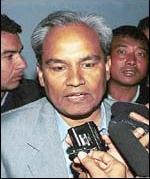 Khum Bahadur Khadka’s acquittal in a corruption case the other day came as an odd relief. At a time when Girija Prasad Koirala – the embodiment, in the view of many, of the ills gripping Nepal’s second phase of democracy between 1990 and 2002 – leading the campaign for national renewal, corruption has become a non-issue indeed. One hopes this latest development encourages Khadka to come out of hibernation.
Khum Bahadur Khadka’s acquittal in a corruption case the other day came as an odd relief. At a time when Girija Prasad Koirala – the embodiment, in the view of many, of the ills gripping Nepal’s second phase of democracy between 1990 and 2002 – leading the campaign for national renewal, corruption has become a non-issue indeed. One hopes this latest development encourages Khadka to come out of hibernation.Khadka pretty much used to be at the forefront when governments rose and fell. If there was any one person responsible for the split in the UML, by common consensus it was Khadka.
With at least two dozens MPs always in his pocket, Khadka kept his own party bosses constantly on their toes. Krishna Prasad Bhattarai, Girija Prasad Koirala and Sher Bahadur Deuba all needed his support to gain power. Once they did, it was always Khadka they were anxious about.
A few months after snatching the premiership back from Bhattarai with the help of Khadka in 2000, Koirala was forced to sack him from the cabinet. Then a little while later, Koirala tried hard to get him back – and failed.
Deuba couldn’t have created his second premiership or subsequently his separate party without Khadka. For some reason, Khadka and Bijay Kumar Gachchadar seemed to be the only ministers King Gyanendra liked to meet directly and let the country know about it.
When Deuba agreed to postpone the 2002 parliamentary elections and was preparing to make a recommendation to the king, Khadka, as home minister, continued to insist that the government could hold the poll in phases. (Imagine how differently things might have turned out had the country heeded him.)
When King Gyanendra sacked the Deuba government on October 4, 2002, Khum Bahadur soon found himself in the lockup. Rumor had it that he had actually evaded the royal dragnet and had reached a southern Indian city, before New Delhi handed him back to Nepal. But, then, that’s just a rumor.
Incarceration must have spurred much introspection. One of the most powerful home ministers was at the mercy of the police force he reigned over. Then one morning, Koirala made a phone call to assure Khadka his full moral support. Deuba was still sulking somewhere.
When he got out on bail, Khadka returned to the Koirala Congress. His inactivity might have been forced; the coterie that had sought to insulate Koirala after the party split certainly didn’t want to cede any influence. Or maybe Khadka kept quiet because his return was an act of expiation.
Asked to explain the source of his wealth after his acquittal, Khadka reminded a reporter that he belonged to well-to-do family. That’s pretty much the standard defense of most crooks. Except, that in Khadka’s case, it might be true.
You can still find Nepali Congress people who know how Khadka used to sneak into his hometown Dang and slip out with crop-generated cash to sustain himself and allies in exile. Whether there are any people still willing to vouch for that is a different matter.
Khadka was in B.P. Koirala’s entourage when the ex-premier returned from exile in India in 1976 with his national reconciliation plea. Khadka wasn’t particularly thrilled with the monarchy and he didn’t shy from voicing that in the 1990s. And let’s not forget those were times when it was mandatory for the political class to extol the perfection with which the monarchy had conformed to its constitutional role.
Khadka is probably in the ceremonial monarchy wing of the party today, and only because he doesn’t want to undercut Koirala in his current enterprise. If he gets back even a fraction of his former ardor, Khadka can certainly emerge as the preeminent kingmaker in a republican Nepal.